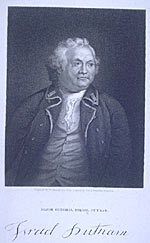|

|
Israel
Putnam was born in Salem Village (now Danvers), Mass. to a
prosperous farming family. In 1740, Putnam left Massachusetts
for northeast Connecticut where land was cheaper and easier
to obtain. He served with the Connecticut militia during the
French and Indian Wars beginning in 1755 and rose to the rank
of major by 1758. Putnam led a regiment in the attack on Fort
Ticonderoga in 1759 and was part of the expedition that captured
Havana, Cuba in 1762. Around the time of the Stamp Act crisis
in 1766, Putnam was elected to the Connecticut General Assembly
and was one of the founders of the Connecticut Sons of Liberty.
Shortly after the Battle of Lexington, Putnam led the Connecticut
militia to Boston and was named major general in the Continental
Army. Putnam was one of the primary figures at the Battle
of Bunker Hill, both in its planning and on the battlefield.
After the British left Boston, Putnam went to New York and
assumed command there until George Washington arrived. Putnam
was involved in the planning of the Battle of Long Island
in 1776, which resulted in a sound American defeat. Putnam
was often at odds with George Washington and served only until
December 1779 before he suffered a stroke, which forced him
to end his military career.
Sources:
Garraty, John A. and Carnes, Mark C., eds. American National
Biography. New York: Oxford University Press, 1999.
Stephen,
Leslie and Lee, Sidney, eds. The Dictionary of National
Biography. Oxford: Oxford University Press, 1921-1922.
|

